Full-spectrum CBD oil is made from Cannabis Sativa extract, which has been used as a medicine for thousands of years. Nowadays, the chemical compound of this plant called CBD is widely popular for its health benefits.
 Explore the best CBD brands in the world
Explore the best CBD brands in the world
Due to its sedative, anti-inflammatory and antioxidant properties, scientists have high expectations regarding its use in different therapies. A few promising cases of CBD use include treatment of neurological diseases, such as epilepsy, as well as, cardiovascular diseases, and even cancer.
CBD-based products are freely accessible as food supplements or wellness products at different shops. But it was not always this way. In 1840, Schlesinger S. was the first investigator, who made an active extract from the leaves and flowers of hemp. Unfortunately, in the first half of the 20th century, most countries banned its use over possible addiction concerns. Only recently, marijuana and its chemically related compounds have come back to being considered of therapeutic value.

Today, high demand for CBD oil drives hemp markets into a bullish state. A YouGov poll published in October 2019 estimated that 11% of UK adults had tried a CBD product while the UK CBD market in 2019 was 300 million. This figure is expected to reach 1 billion by 2025.
People?s distrust in modern pharmaceuticals adds fuel to the fire as long-term use of pills can adversely affect your health. It is enough to look at the medication guides where you can find a long list of possible side effects. For that reason, many people consider limiting the use of chemically produced drugs. They prefer to substitute it with more natural options. And CBD appears to be the best alternative because it is safe for daily consumption.
The market is so full of CBD products. It might be challenging to choose the right one among such a wide variety of products. We will split our research into a few sections, to provide you with the detailed information on full-spectrum CBD oil. Firstly, we will talk about its chemical compounds. Then we will move to different types of CBD oil. Later on, we will go through the legal status of controlled substances that are present in full-spectrum CBD oil. Last, but not least, we will talk about travel restrictions, as many countries impose certain limits.
So, let?s get started.
What do we know about CBD and THC cannabinoids?
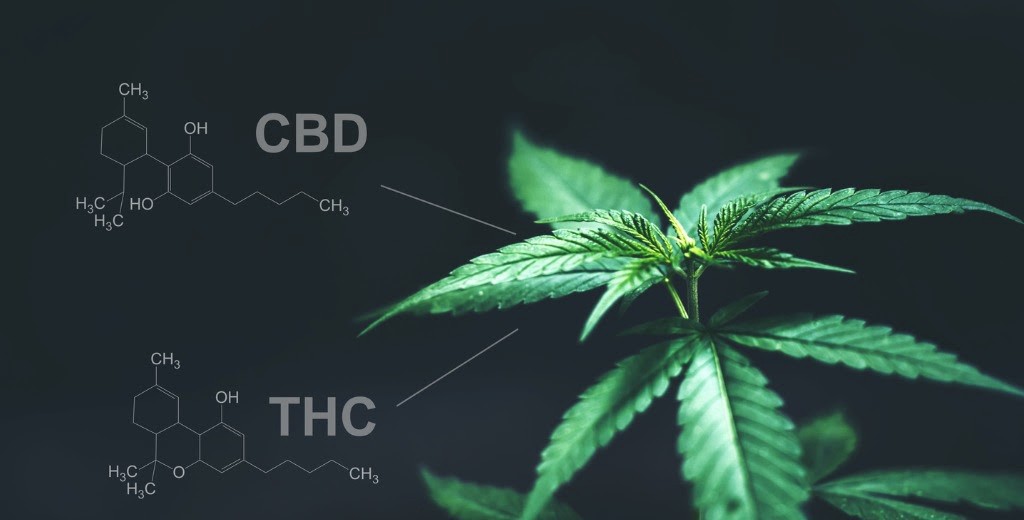
CBD and THC are the main phytocannabinoid entities extracted from the Cannabis Sativa and then added to full-spectrum CBD oil. It was proved that when combined, these two cannabinoids enhance each other?s properties. Besides CBD and THC cannabinoids, there are some other types of chemical entities present in full-spectrum CBD oil: omega acids, terpenes and flavonoids. Terpenes, for example, can be beneficial in treating cardiovascular diseases and even cancer.
CBD or cannabidiol is the most well-known compound of Cannabis Sativa. It is consumed in many different forms: oils, pills, extracts, vapes, drinks, body creams and the list goes on. This natural compound gained so much attention from the public because of two factors: obvious health benefits with almost no side effects and clear legal status. But to be available for public sale, the government only allows extracting CBD from industrial hemp.
CBD does not have any psychoactive properties. THC (delta-9-tetrahydrocannabinol), on the contrary, is a primary psychoactive compound present in full-spectrum oil. However, it can influence your cognitive abilities only when consumed in large doses. Since full-spectrum CBD oil includes only a trace of THC component, it will not make you ?high?.
It is also noteworthy to mention that at the beginning of the 1900s scientists found the so-called endocannabinoid system, which was formed at the early evolutionary stage, around 500 million years ago. This system of neurotransmitters is present not only in humans and highly organised representatives of the animal kingdom, but also in the most primitive organisms.
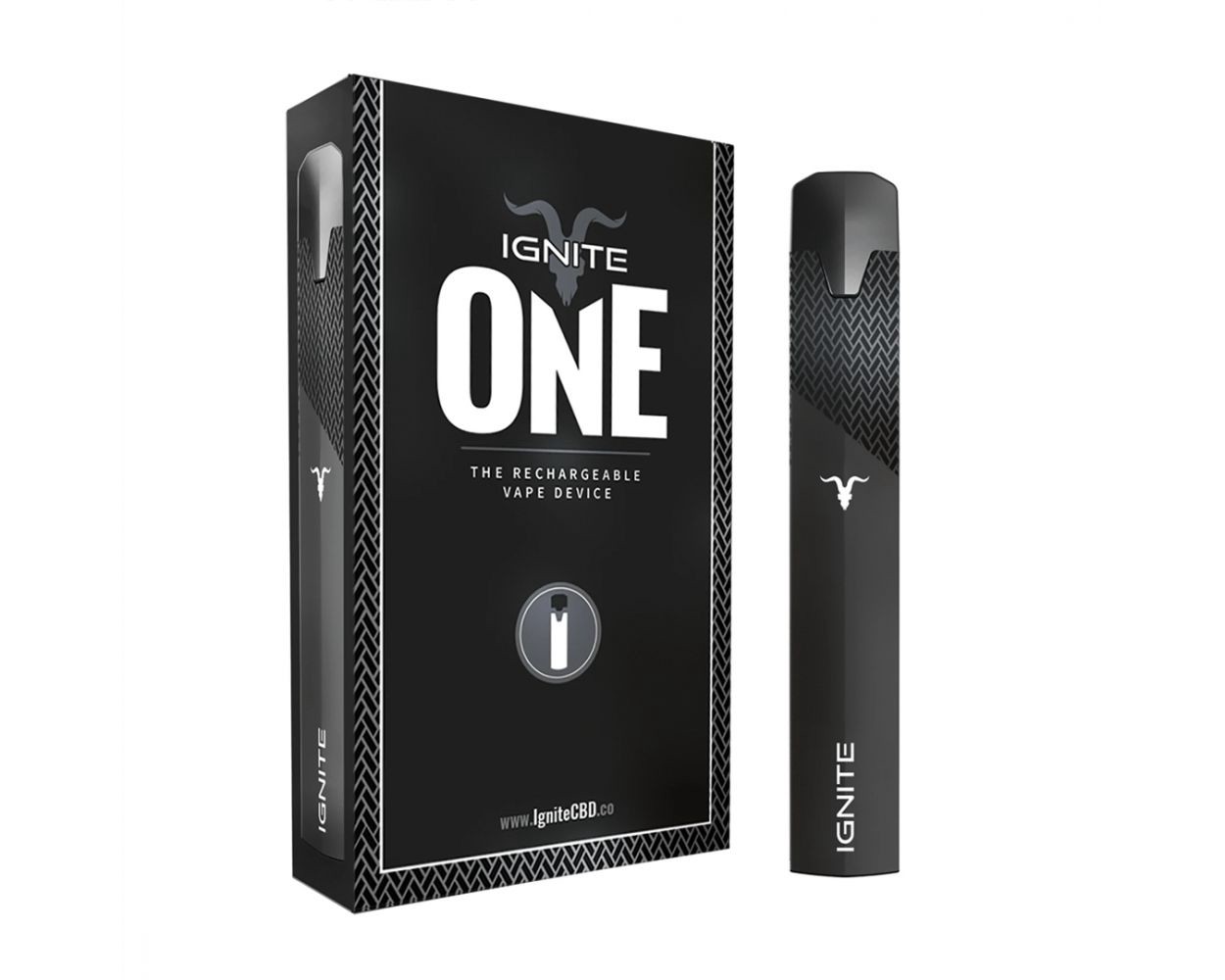 Joining the vaping trend can be both intimidating and confusing, partly because there is so much information out there that leaves beginners more confused than enlightened. The simple truth is, wondering what and how to vape should not hold you back from trying.
Joining the vaping trend can be both intimidating and confusing, partly because there is so much information out there that leaves beginners more confused than enlightened. The simple truth is, wondering what and how to vape should not hold you back from trying.
The endocannabinoid system provides control of many physiological functions of the body, including regulation of the nervous and immune systems, metabolism, reproduction and cell growth. The main components of the endocannabinoid system are receptors called CB1 and CB2.
CB1 and CB2 are members of the receptors superfamily associated with the G-protein. The differences between them are determined by the sequence of their amino acids, signalling mechanisms, localisation features, as well as the nature of the interaction with some agonists and antagonists.
CB1 receptors are localised in the brain and spinal cord, peripheral nervous system, as well as many other organs and tissues. In the brain, the concentration of CB1 receptors is higher than any other receptors involved in neuromodulation processes. Cortex, hippocampus, basal ganglia, pillow, cerebellum, tonsil and hypothalamus are the main places of its concentration. These brain parts are responsible for cognitive functions, emotions, motor reactions, sensory information processing, memory and homeostasis.
CB1 receptors are also found in minimal amounts in the brain stem. However, they are practically absent in the respiratory centres, which explains the rather low frequency of deaths with an overdose of psychoactive hemp.
In addition to the nervous system, CB1 receptors are found in the heart, lungs, endothelium, gastrointestinal tract, prostate, as well as in the bone marrow, tonsils, spleen and thymus gland. The amino acid sequence of CB1 receptors in humans, rats, and mice is 97?99% identical.
CB2 receptors are concentrated mainly in organs and tissues that provide an immune response ? in the spleen and its macrophages, thymus gland, tonsils, bone marrow, blood leukocytes.
What are the most popular CBD oil types?
To have a bigger picture on all benefits of different types of CBD oil, we will briefly describe the most popular extracts available for the public sale. Each type contains a specific amount of compounds and is extracted in different ways: whether with alcohol, natural plant oils or carbon dioxide.
CBD isolate
Isolated form of CBD can be the best option for you if a high concentration of CBD is a crucial point. During the extraction, all compounds of the cannabis plant are removed, while CBD is the only cannabinoid that stays. High-quality products might contain up to 99.9 per cent of CBD.
Yet, if your choice falls on CBD isolate, we advise you to request the lab tests from the manufacturer, so that you can be sure that there are no traces of THC present in the product, or at least a legally allowed amount.
Broad-spectrum CBD oil
Broad-spectrum CBD oil contains different types of cannabinoids, terpenes and essential oils, as in a full-spectrum. The only difference is that it is a THC-free product. During the extracting process traces of THC are isolated and then removed, while other components are still preserved.
Full-spectrum CBD oil
Full-spectrum CBD oil is a pure extract from cannabis with a full bouquet of different cannabinoids. THC and CBD are the main compounds in the plant that are praised for their synergetic therapeutic effects. Some other cannabinoids might be present in the extract, but mostly there are some traces of CBN (Cannabinol), CBG (Cannabigerol), THCV (Tetrahydrocannabivarin) and CBC (Cannabichromene).
What makes full-spectrum outstand from other types of CBD oils?
There are a few essential points that make full-spectrum CBD oil a more preferable option compared to isolates and broad-spectrum. First of all, it has a full combination of all chemical compounds, which gives a much better effect. Secondly, it is scientifically proved that cannabidiol works more efficiently in synergy with terpenes and other cannabinoids, and partially loses its properties when isolated. And another more pleasant reason: terpenes produce a nice subtle scent that gives full-spectrum oil a better aroma and taste, compared to isolated CBD oil, for instance, which is totally tasteless.
What is that famous ?entourage effect? everyone is talking about?

The entourage effect is a concept suggesting that one isolated molecule from the cannabis plant is not enough to grasp the entire potential. Scientists concluded that a combination of different cannabinoids together enhances the properties of each one of them. Thanks to this ?entourage effect?, full-spectrum CBD oil is considered to be one of the most popular options for daily consumption.
We also know what you are curious about: if there is a chance to get high on full-spectrum CBD oil? And our answer is definitely No. To make it available for public sale, manufacturers are obliged to produce oil only with the legally allowed amount of THC. In each country, the number may vary. In the United Kingdom, for instance, it should be less than 0.2 per cent. Such little amount of THC is considered to be perfectly safe for daily consumption because it does not have any psychoactive properties. Therefore, it barely has any influence on the perception of reality.
So, now let?s have a quick stop on less popular cannabinoids than CBD and THC.
Other cannabinoids found in hemp plants
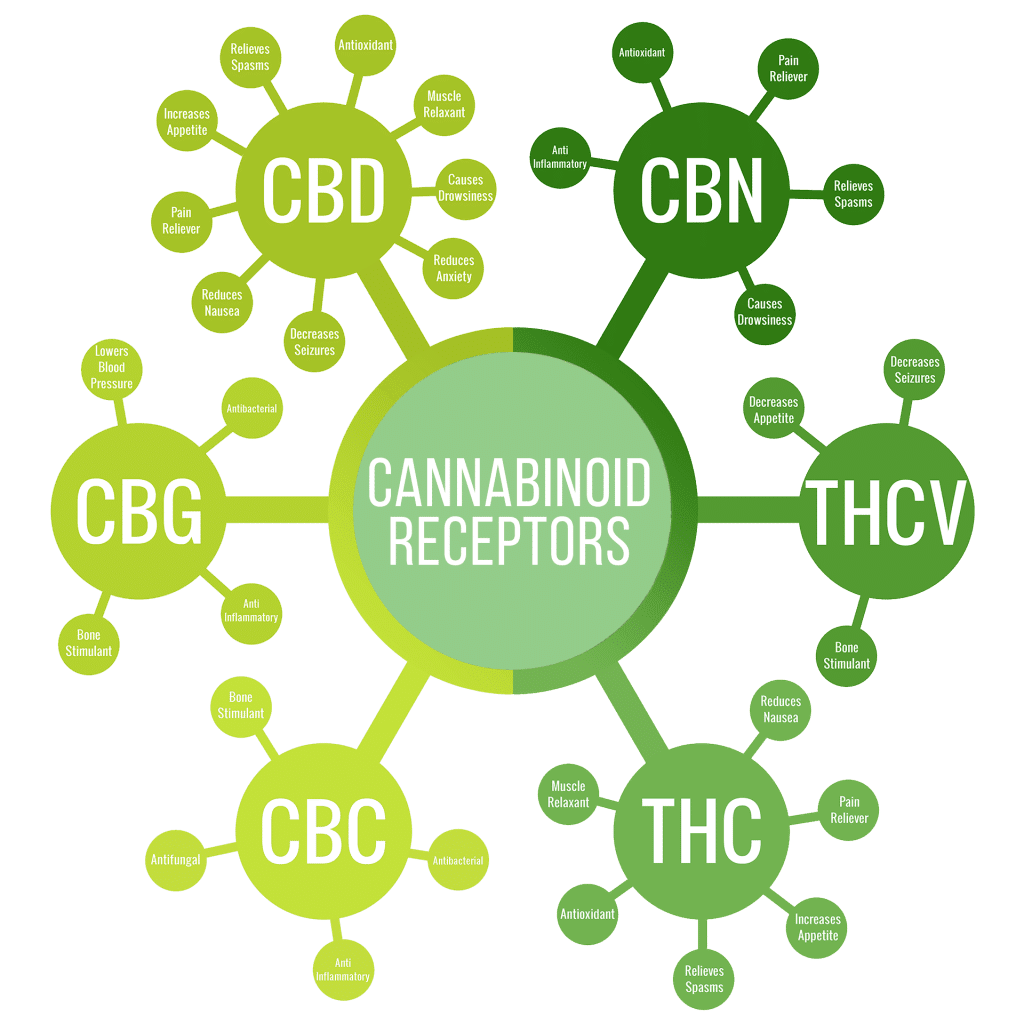
- Cannabinol
CBN is created when THC ages and has minimal psychoactivity compared to its parent cannabinoid. So, the older the cannabis plant, the more CBN is produced. But even when consumed in large doses, it shows to have almost no effect on the cognitive functions. Cannabinol is one of the minor cannabinoid components present in the cannabis plant. Together, all rare cannabinoids make up less than 1% of the plant.
One study on rabbits showed that dosing CBN might lead to the reduction of intraocular pressure ? the main cause for glaucoma. Still, it is only an initial research stage of its effectiveness in curing this disease. Scientists continue to investigate the CBN compound and collect necessary data on its therapeutic potential.
- Cannabigerol
CBG is called a ?stem cell? because its cannabigerolic acid is the primary cannabinoid from which all other cannabinoids start off.
In 2015, researchers discovered cannabigerol?s neuroprotective effects with Huntington?s disease and had shown promising results in slowing down colon cancer. It produces modest antifungal effects and also might be useful in treating psoriasis.
- Tetrahydrocannabivarin
THCV is another organic cannabinoid found in the cannabis plant. It has benefits that have already been proven to show positive signs in different treatments. In small doses, THCV will not give you a psychoactive effect. However, if you increase the dosage, it can start to react with CB1 receptors and trigger the well-known ?high? state. There is just a little percentage of THCV compound present in full-spectrum CBD oil, so it definitely won?t cause any reality distortions.
In the animal test, it shows potential in diabetes treatments. THCV reduced levels of blood glucose, consequently helping the body to produce more insulin. Studies also show that this compound can be an effective appetite suppressant for those who struggle with weight loss, and other ailments are proving to be very useful.
- Cannabichromene
CBC is a non-psychoactive chemical entity that deserves no less attention. Cannabichromene may play its role in cancer treatments because it interacts with the body?s natural endocannabinoid, anandamide. CBC also inhibits the uptake of anandamide, therefore allowing it to remain longer in the bloodstream.
As per studies, cannabichromene also showed pain-relieving properties and its role in the reduction of inflammation associated with collagen-induced osteoarthritis.
Now that the picture is more precise, you can see that each cannabinoid has a different effect on the body.
Pros and cons of full-spectrum CBD for health
Full-spectrum CBD oil has a great range of health benefits, due to the different cannabinoids contained within the product. It may help to treat several health conditions. Let?s discuss some of them individually.
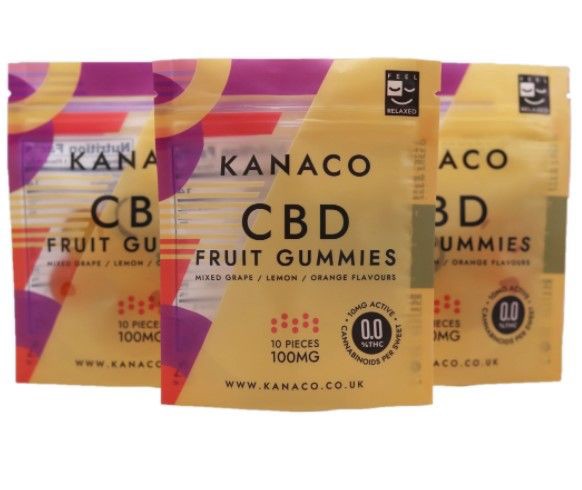 Kanaco CBD gummies bundle deal is a cost-effective way to purchase three packs of fast-acting colourful and tasty gummies and get the 3rd at a half price. Chewing CBD gummies is both delicious and effective: CBD will provide needed relief and unwind while 100% natural snack will supply needed CBD dose.
Kanaco CBD gummies bundle deal is a cost-effective way to purchase three packs of fast-acting colourful and tasty gummies and get the 3rd at a half price. Chewing CBD gummies is both delicious and effective: CBD will provide needed relief and unwind while 100% natural snack will supply needed CBD dose.
Pain and Inflammation
Chronic pain and inflammation are two of the most common reasons that make people use CBD oil. Full-spectrum is the best natural option for people with chronic diseases who can?t access medical marijuana. Thanks to its antioxidant properties, daily consumption can lead to a reduction of inflammation and help in treating autoimmune illnesses. Also, CBD oil promotes better sleep and mental health, which is a common problem experienced by people with chronic pain.
Common types of chronic pain include:
- Headaches
- Back pain
- Migraines
- Sclerosis pain
- Neuropathic pain
- Osteoarthritis
- Cancer pain
Anxiety
A feeling of anxiety is something many of us experience to some degree throughout our lives. Mostly, low-level anxiety goes away. However, it is not the case for all people. Many people struggle with its symptoms for long periods, and that?s when the doctor announces the diagnosis. Full-spectrum CBD oil is known for its calming effect and can undoubtedly help in improving the quality of life.
One study on humans found that the people who took 400 milligrams of CBD had significantly decreased subjective anxiety compared to a placebo. In 2019, a study of 72 adults found that anxiety decreased in 79% of the participants.
Nausea
The cannabinoids can help manage nausea and vomiting. To be more specific, THC contained in full-spectrum CBD oil can be beneficial for people who have eating disorders. THC stimulates appetite and therefore accelerates the recovery process of people with anorexia nervosa.
Alzheimer?s and Parkinson?s diseases; Dementia
Alzheimer?s is a neurodegenerative disease, which is considered to be the worst type of dementia. It negatively affects memory, thinking and behaviour. Unfortunately, Alzheimer?s progresses with time, and without proper treatment, it can lead to a partial loss of cognitive functions. In the worst-case scenarios, people with AD might stop recognising faces, have speech impairments and lose control over their emotions. That?s when they need to be assisted for 24 hours by their relatives or doctors.
Currently, there is no cure found to treat or reverse disease progression. However, there are several treatments available to ease the symptoms. And here CBD also shows promising results.
In 2017 a group of US scientists found that consumption of CBD oil increases interconnectivity in the brain cells. Because of its antioxidant properties, CBD reduces internal inflammation and works as a shield to the neurons and encourages its growth.
CBD, with its neuroprotective effects, has also shown potential in reducing movement disorders in people with Parkinson?s.
Parkinson?s is one of the most common diseases among older people. The disorder is characterised by motor impairments, such as hyperkinesia, involuntary tremors, muscle rigidity, stiffness and non-motor symptoms, such as problems with sleep, cognitive deficits, anxiety, depression, psychotic symptoms.
Use of CBD oil may prevent loss of dopamine-producing neurons, reduce internal inflammation and ease other neurological symptoms.
Cancer
According to World Health Organization statistics, cancer is a leading cause of death worldwide, accounting for an estimated 9.6 million deaths in 2018.
The most common cancers are:
- Lung (2.09 million cases)
- Breast (2.09 million cases)
- Colorectal (1.80 million cases)
- Prostate (1.28 million cases)
- Skin cancer (non-melanoma) (1.04 million cases)
- Stomach (1.03 million cases)
The most common causes of cancer death are cancers of:
- Lung (1.76 million deaths)
- Colorectal (862 000 deaths)
- Stomach (783 000 deaths)
- Liver (782 000 deaths)
- Breast (627 000 deaths)
There is still no double-blind placebo study available on the role of CBD and THC in cancer-preventing therapies. As we know it, cancer is a very tricky disease. It makes the cells mutate to abnormal extremes. However, tests done on animals showed some positive signs. While undergoing chemotherapy, CBD in combination with THC may ease the symptoms of nausea, vomiting, increase appetite and improve sleep.
During a small pilot study in 2016, the use of cannabinoids showed promise in the fight against cancer. The researchers found that cannabinoid compounds seem to inhibit the growth of many different types of tumour cells both in vitro and in vivo.
According to this study, phytocannabinoids and their analogues can lead to inhibition of the growth of many tumour types, exerting a cytostatic and cytotoxic neoplastic effect on cells, thereby negatively influencing the ability of cells to metastasize.
 Explore the best CBD products
Explore the best CBD products
Rheumatoid Arthritis
Rheumatoid Arthritis is a chronic disease that strikes people at any time, but the likelihood increases with age. The onset is the highest among adults in their 60s. Mostly women from developed countries are under the risk of developing this condition. The illness affects the joints, connective tissues, muscle, tendons, and fibrous tissue.
Even though it is considered to be incurable, there are still some arthritis treatments available that can slow down the chronic inflammation and relieve the pain. Among such therapies are: gold injections, joint replacement with synthetic materials, as well as treatments with disease-modifying antirheumatic drugs that block cytokine production.
One of the main benefits of full-spectrum CBD oil is its positive effect on pain. A study conducted in 2017 analysed whether cannabidiol could prevent osteoarthritis pain and joint neuropathy. Based on the results, scientists affirmed that it worked in both directions: it decreased joint inflammation and served as a protection for nerves.
Side Effects and Safety
Many consumers are concerned about possible side effects of full-spectrum CBD oil. Due to the lack of proper regulations, the amount of CBD and psychoactive THC in many products might be inconsistent.
While CBD is the main non-psychoactive component of the cannabis plant, in studies using different doses and routes of administration, a few side effects were reported, including:
- anxiety
- changes in mood
- diarrhoea
- drowsiness
- dry mouth
- low blood pressure
- nausea
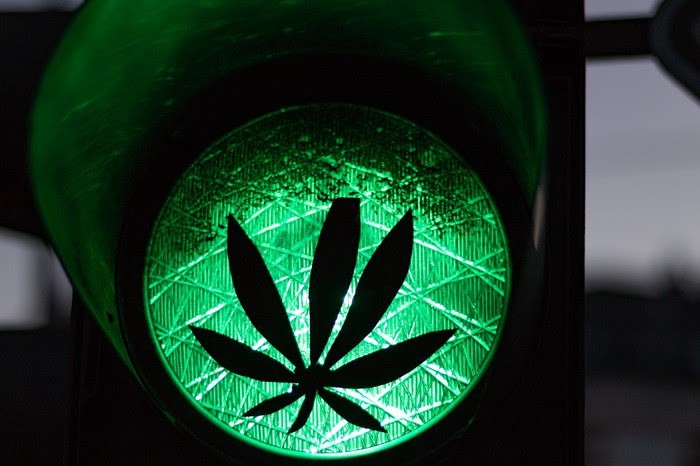
How much of full-spectrum CBD oil should you take?
As for now, there is no available information from the FDA on a Recommended Daily Intake for CBD, which means CBD does not have an official serving size.
Probably those who have already started using CBD oil, after a few months of trying through trial and error, found the most suitable dosage for themselves.
As for the newbies, we always recommend to start slow. The body can have different reactions to different doses, and to be on the safe side, it is better to go slow. Then, increase the dose little by little to the point where you feel the needed effect. Even if you overdose, it is not that dangerous. You can just simply reduce the amount and keep consuming the lower dose as usual. Just remember to observe the body?s reactions to each dose. It is also important to consult your doctor before taking any kinds of supplements.
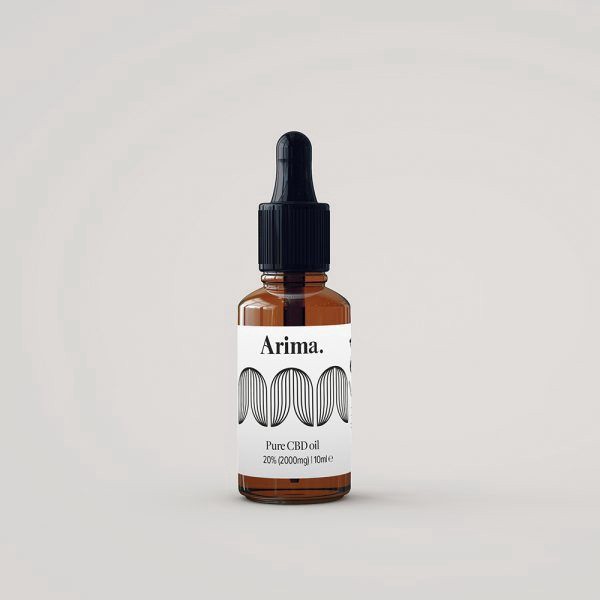 The High Strength 20% (2000mg) CBD oil from Arima is a natural, potent product that will not only make you feel good; but convince you to believe in the true, healing powers of nature, and help you live a healthier life.
The High Strength 20% (2000mg) CBD oil from Arima is a natural, potent product that will not only make you feel good; but convince you to believe in the true, healing powers of nature, and help you live a healthier life.
Remember to take into account such important factors as:
- The concentration of CBD and THC compounds in the product
- The overall physical state of the individual (weight, height, underlying conditions)
- The severity of the disease that needs to be treated
Speaking of numbers, we recommend starting with a small dose of 5 mg per day, just to see how the body responds. Later on, you can increase to 2 daily doses. Do not skip this critical part, because you can?t be sure how your organism might react to cannabinoids.
According to the Consumer Products and the Environment (COT) report, CBD can damage the liver. Therefore it is not recommended to take more than 70mg of CBD per day, which is equal to 28 drops of a 5% CBD product.
COT is a British independent scientific committee that advises the Department of Health and Health Care, the Food Standard Agency, and other organizations regarding chemicals? toxicity.
In February 2020, the Food Standards Agency (FSA), the organisation that regulates the legal flow of CBD in the UK, stated that they do not recommend the use of CBD to breastfeeding and pregnant women, and people who take prescribed medications.
Regulating full-spectrum CBD oil in the UK.
The Home Office is the regulatory body that issues licenses for the UK companies that produce and sell products with controlled cannabinoids. Firstly, they need to satisfy all the relevant requirements of the Medicines and Healthcare Products Regulatory Agency (MHRA), Food Standards Agency (FSA) and Trading Standards. After that, the Home Office decided whether the company meets all the needed criteria to be granted a license.
March 31, 2021, is the latest date when all UK manufacturers of CBD products are obliged to submit a valid novel food authorisation application. After the deadline, only brands with submitted forms will be allowed to remain on the UK market. The main goal of this new regulation is to align the UK and EU?s positions on CBD.
There are still a few types of CBD products that do not fall under this deadline category. Among these are: cosmetics, vapes, products making medicinal claims, products containing THC and other controlled drugs.
Cannabidiol (CBD) and its legal status
CBD, as a primary chemical compound of Cannabis Sativa plant, does not fall in the category of state-controlled drug. The UK government takes into consideration that it is difficult to isolate pure CBD while many products do not undergo full-spectrum analysis at an appropriate level. Therefore, all CBD containing products would be controlled under MDA 1971/MDR 2001 as a result of other cannabinoid content.
Tetrahydrocannabinol (THC) and its legal status
THC is considered to be a Schedule 1 controlled cannabinoid. As full-spectrum CBD oil contains traces of THC, suppliers are obliged to openly state that their products contain this substance, along with other compounds, such as CBN and CBDV. According to Regulation 2 of The Misuse of Drugs Regulations (2001), up to 1 mg of a controlled substance is allowed within a product container, if the necessary criteria are met. For instance, if the manufacturer produces a 10 ml bottle of full-spectrum CBD oil containing 500 mg or 5 per cent of CBD extract, and the THC amount is equal to 0.2 per cent, then it means there is 1 mg of THC in this product. With such an amount of THC in the CBD product, it can be legally sold for the public.
Travelling internationally with full-spectrum CBD oil

Travelling with full-spectrum CBD oil might be a tricky task as every country has its own rules and regulations. To be on the safe side, we advise you to conduct your research about the flight authorities regulations. Even though CBD is legal in some countries, certain restrictions still might apply.
Start your research with the company that will fly you to your destination. The company?s website should have all the necessary information that you need to know, such as the size restrictions of carry-on luggage.
If you fly on the territory of the United States, you will not have any problems. A new Farm Bill that was signed in 2018 legalised cannabis-based products on a federal level in the United States. There are only two restrictions that apply to this type of products: the presence of the THC compound cannot exceed 0.3 per cent, and it should be made from industrial hemp.
Clear restrictions are needed to keep the limited THC range, and an honest manufacturer should always test the products in a lab to receive a COA certificate. You can carry the Certificate of Analysis with yourself to show it on the border control. Usually, you can find the COA inside the product package. In some cases, it is available for download on the producer?s website. It will also help you avoid additional questions from the airport workers.
In the United Kingdom, it is legal to carry CBD oil for travel under some conditions. CBD products must be THC-free and farmed from EU-approved industrial hemp. However, the flight provider may have additional regulations applied to CBD products, so it is better to double-check the information with the flight provider. Also, if you carry hand luggage, the CBD oil container should not exceed 100 ml.
In the European Union, you might still need to present a declaration signed by a doctor, in case of medicinal CBD oil. The allowed amount of THC must be less than 0.2 per cent.
The list of CBD-friendly countries also includes Canada, Israel, India, Argentina, Chile, South Africa, Russia and some more.
And where CBD oil is fully restricted?
Use and possession of cannabis and cannabis extract products are fully prohibited in the Middle East region. You can be accused of drug trafficking and be sentenced to a prison term and even face the death penalty. To be fully secured, before travelling to the Middle East countries, double-check your luggage and never carry any kind of CBD-based products.
Asia is another region where the majority of countries restrict CBD oil consumption. Japan and Singapore only allow travelling with THC-free products. If you need to use the CBD oil in Japan, it will be a better option to purchase it from the local manufacturers.
Anyway, if you still have some doubts regarding travel restrictions, it is better to be on the safe side and leave your supplement at home.
Conclusion
Full-spectrum CBD oil is undeniably one of the best natural supplements available on the market nowadays. For centuries extracts from Cannabis Sativa have been praised for their therapeutic properties. And only now it received the attention that it truly deserves.
Scientists have already proved that CBD, THC and other cannabinoids have anti-inflammatory and antioxidant properties. This discovery might help to manage many incurable diseases. We believe that in the upcoming decades there will be even more promising discoveries on CBD health benefits. That will make CBD a real competitor to traditional pharmaceutical drugs and bring an alternative medicine to a whole new level.
Verified by a Healthcare Professional
Anastasiia Myronenko

Anastasiia Myronenko is a Medical Physicist actively practicing in one of the leading cancer centers in Kyiv, Ukraine. She received her master?s degree in Medical Physics at Karazin Kharkiv National University and completed Biological Physics internship at GSI Helmholtz Centre for Heavy Ion Research, Germany. Anastasiia Myronenko specializes in radiation therapy and is a fellow of Ukrainian Association of Medical Physicists.
This article includes the promotion of products and services sold on Alphagreen and affiliate links to other businesses.
Alphagreen and its materials are not intended to treat, diagnose, cure or prevent any disease. The information and products presented on this site are not intended for medical use nor do they make any medical claims. Always seek the advice of your physician or another qualified healthcare provider for any questions you have regarding a pre-existing medical condition, are pregnant and/or are breastfeeding, and before undertaking any diet, exercise or another health-related program.

